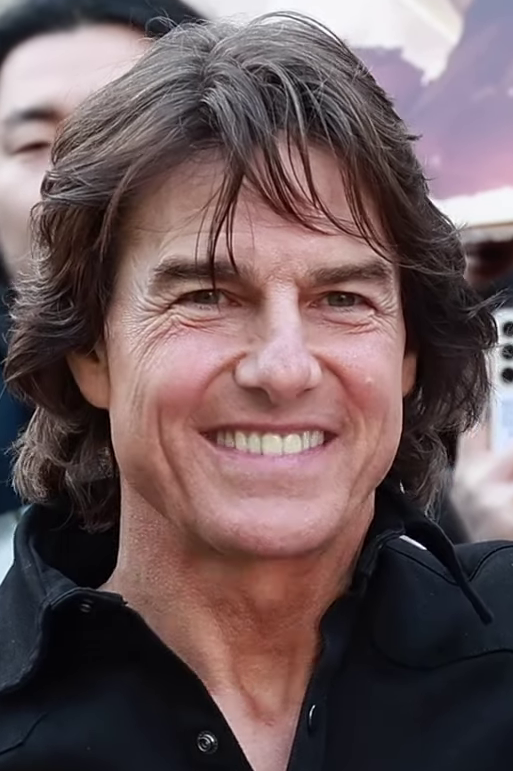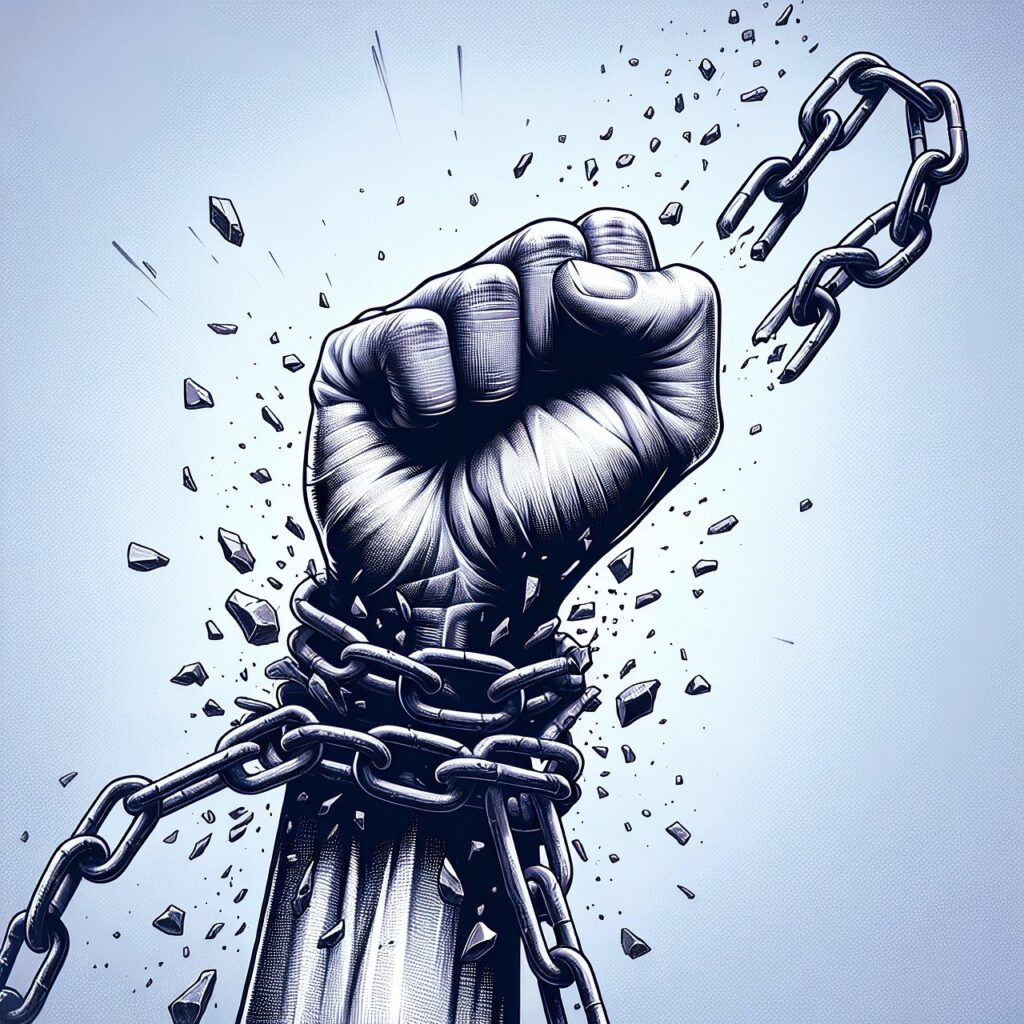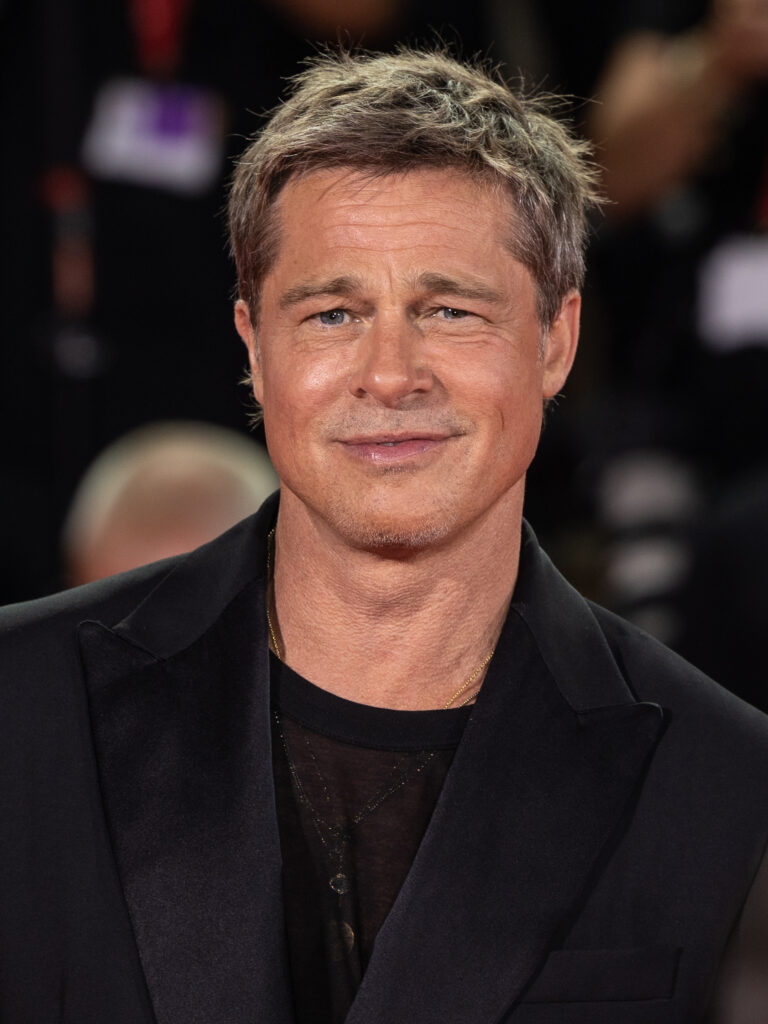
Tom Cruise. The name alone conjures images of death-defying stunts, megawatt smiles, and an unwavering commitment to cinematic excellence. For decades, he’s been Hollywood’s quintessential leading man, a figure of incredible composure whether he’s scaling skyscrapers or saving the world on the silver screen. We’re used to seeing him embody characters who are calm under immense pressure, navigating impossible missions with a steely resolve that makes us believe anything is possible.
But even the most composed stars have their limits, and sometimes, even the most seasoned journalists push those boundaries a little too far. There are moments when the line between public curiosity and personal intrusion becomes irrevocably blurred, and when that line is crossed with a star of Cruise’s magnitude, the result can be pure, unadulterated drama that sends shockwaves through the entertainment world. It’s the kind of story that becomes legend, discussed and dissected for years to come.
Today, we’re taking a deep dive into one of those unforgettable moments – an interview segment that went semi-viral on Reddit, igniting fierce debate among fans and critics alike. It was a toe-curlingly awkward confrontation that saw the “Mission Impossible” actor, a man rarely seen ruffled, tell off a journalist for asking increasingly intrusive questions about his highly personal life. Get ready, because we’re about to unpack the precise questions, the escalating tension, and the explosive breaking point that made Tom Cruise draw a very public line in the sand.
1. **The Tense 60 Minutes Setting: A Post-Divorce Powder Keg**
The year was 2005, and Tom Cruise was sitting down for a 60 Minutes interview with journalist Peter Overton. This wasn’t just any ordinary chat; the air was thick with unspoken tension, perhaps even a hint of apprehension. At the time, Cruise and Nicole Kidman had not long separated, having ended their 10-year marriage just four years prior. This fact alone set a delicate stage for any conversation about his personal life.
For a star of Cruise’s stature, every public appearance, every word spoken, is scrutinized under a microscopic lens. The public, and by extension, the media, was undoubtedly hungry for insights into his personal world, especially after such a high-profile divorce. It created an environment ripe for probing questions, even those that might typically be considered off-limits.
The context of a recent, highly public separation makes any inquiry into past relationships a particularly sensitive subject. Tom Cruise, understandably, was a little defensive about the topic. The interview was poised on a knife’s edge, balancing the actor’s right to privacy against the media’s relentless pursuit of answers that supposedly satisfied public curiosity.
Overton, a seasoned journalist, was clearly prepared to venture into territory that many might shy away from. He was ready to push boundaries, perhaps believing it was his duty to uncover the emotional truths behind the headlines. This clash of intentions between a defensive star and a determined interviewer set the scene for the unforgettable exchange that was about to unfold.

2. **The ‘Love of His Life’ Interrogation: The Question That Started It All**
The moment arrived, sharp and direct. Journalist Peter Overton, during this tense 2005 60 Minutes interview, looked Tom Cruise in the eye and posed a question that would forever be etched into interview history. He asked the Hollywood actor whether his ex-wife, Nicole Kidman, was the ‘love of his life’. It was a bombshell, dropped squarely into what was already a delicate conversation.
This wasn’t a question about his latest blockbuster or his next daring stunt; it was an deeply personal inquiry, forcing Cruise to publicly dissect his past emotions about a relationship that had concluded years prior. It’s the kind of question that instantly makes an audience squirm, creating that palpable, toe-curling awkwardness that makes reality television so compelling, but is rarely seen in a high-profile interview of this caliber.
The nature of the question itself speaks volumes. It’s designed to elicit a strong emotional response, to crack open a carefully constructed public persona. By asking if someone was the ‘love of his life,’ Overton wasn’t just seeking a factual answer, but a window into the actor’s soul, a dramatic soundbite that would undoubtedly grab headlines and fuel endless discussions.
It’s a masterclass in journalistic provocation, undeniably effective in capturing attention. However, it also immediately signaled to Cruise that the interview was veering sharply from professional discourse into intensely private territory. The stage was set, and the uncomfortable spotlight was now firmly on the actor’s past heartbreaks, demanding an emotional accounting for the public’s consumption.

3. **Cruise’s Blunt Initial Rejection: A Star’s First Defense**
Faced with such a direct and deeply personal question about his past marriage, Tom Cruise’s initial reaction was swift and unequivocal. He didn’t offer a nuanced explanation or a polite deflection. Instead, he simply and bluntly responded: “How do you answer that question?”. It was less a question seeking guidance and more a rhetorical statement, a clear signal of his discomfort and an implicit challenge to the very premise of the inquiry.
This response was a testament to his attempt to maintain a boundary, a refusal to engage with a question he clearly deemed inappropriate for public consumption. It was a polite but firm pushback, an effort to steer the conversation back to safer ground without causing an immediate scene. He wasn’t storming off yet; he was simply questioning the validity and appropriateness of the line of inquiry, buying himself a moment to collect his thoughts.
For anyone watching, Cruise’s body language and tone conveyed a man who was already on guard, aware that the interview was heading into contentious waters. His reluctance to answer immediately highlighted the sensitivity of the topic and his desire to shield a very personal aspect of his life from public scrutiny. It was an initial, measured defense, hoping that the journalist would pick up on the cues and back away.
However, in the high-stakes world of celebrity interviews, a subtle pushback is often just an invitation for more persistent probing. While Cruise had clearly expressed his discomfort, his response, though blunt, didn’t entirely shut down the journalist. It left a tiny crack in the door, allowing the determined interviewer to press on, leading to the escalating tension that would soon define the infamous encounter.
4. **Overton’s Persistent Digging: The Public Wants to Know?**
Despite Tom Cruise’s clear discomfort and his rhetorical challenge to the “love of his life” question, journalist Peter Overton didn’t back down. In fact, he doubled down, adding fuel to the already simmering fire. Overton continued his line of questioning, stating that ‘the public wanted to know the answer’. This justification served to amplify the pressure on Cruise, implying that his privacy was secondary to the collective curiosity of his fans.
This tactic, invoking the nebulous ‘public interest,’ is a common journalistic approach to justify intrusive questions. It places the burden of withholding information squarely on the celebrity, painting their reluctance as an act of denial rather than a rightful claim to personal boundaries. For Cruise, it meant that his earlier, polite pushback had been ignored, and the invasion of his personal life was only intensifying.
The moment became increasingly awkward to watch. The journalist’s persistence transformed the interview from a dialogue into a relentless interrogation, creating a power dynamic where the star was being cornered. It was a clear demonstration that Overton was not going to let the topic drop, regardless of Cruise’s discomfort or his attempts at deflection.
This sustained pressure chipped away at Cruise’s composure, making it evident that the interview was spiraling. The journalist’s insistence on a deeply personal answer, framed as a public demand, created an environment where a breaking point seemed not just possible, but almost inevitable. The stage was being set for a more explosive reaction than just a rhetorical question.

5. **A Star’s Plea for Happiness: Humanizing the Divorce**
Before finally reaching his breaking point, Tom Cruise made one more attempt to de-escalate the increasingly fraught interview, trying to offer a genuine, heartfelt perspective. Though the journalist didn’t stop digging, Cruise tried to explain his feelings, articulating that he just wanted his ex, Nicole Kidman, to be happy. It was a moment of raw humanity amidst the escalating media pressure.
This response was an attempt to shift the focus from a sensationalized emotional declaration to a more mature and compassionate sentiment. Instead of being drawn into a debate about the intensity of past love, Cruise aimed to express a simple, universal desire for the well-being of someone he had once shared a significant portion of his life with. It was a bid to humanize the situation and perhaps appeal to Overton’s understanding.
In that moment, Cruise wasn’t just a global superstar; he was a man reflecting on a past relationship, trying to convey a message of peace and goodwill. It was a vulnerable admission, a peek behind the carefully curated celebrity facade, showing a genuine concern for another person’s happiness, rather than his own ego or public image.
However, even this sincere and deeply personal insight failed to deter the journalist’s relentless pursuit of a different kind of answer. The desire for a dramatic confession or a definitive statement about ‘love of his life’ seemingly overshadowed Cruise’s plea for understanding and respect for his personal feelings. This ultimately led to the final, explosive confrontation.
6. **The Explosive Line in the Sand: “You’re Stepping Over a Line Here”**
The previous attempts at deflection, the polite pushback, and the heartfelt plea for understanding had all been met with relentless persistence. Eventually, after Overton’s continued digging, Tom Cruise reached his limit. He completely lost his cool, and the previously contained tension erupted into an unforgettable warning that instantly became iconic. He told Overton, with palpable intensity, to ‘put his manners back in’.
This direct and forceful command was followed by an even more pointed warning, leaving no room for misinterpretation. Cruise looked the journalist squarely in the eye and stated: “You’re stepping over a line here, you know you are.” It was a clear, unambiguous declaration that his personal boundaries had been violated beyond endurance, and he was no longer willing to tolerate the intrusion.
The clip, which later went semi-viral on Reddit, captured a rare moment where the often-impassive superstar showed raw emotion and anger. It was a visceral reaction, not a calculated response, and it laid bare the immense pressure celebrities face to reveal their most intimate feelings, even years after the fact. This was the moment the interview transformed from awkward to truly explosive.
This stark warning served as Cruise’s ultimate defense, a clear indication that he was taking control of the narrative and shutting down the invasive questioning once and for all. It wasn’t a physical storm-off, but a verbal one, an act of drawing a definitive line that he felt had been repeatedly trampled. The gravity of his words and the intensity of his delivery ensured that the message was received loud and clear, marking the climax of one of Hollywood’s most talked-about interview confrontations.
The dust may have settled on that particular 60 Minutes interview, but the echoes of Tom Cruise’s fiery defense of his personal space resonated deeply, sparking a passionate debate that went semi-viral on Reddit years later. Fans and critics alike dissected every nuance of the exchange, proving that even a decade and a half later, the question of celebrity privacy versus public intrusion remains a hot-button issue. This wasn’t just about Tom Cruise; it was about where we draw the line. And boy, did they have opinions!

7. **The Public’s Demand? Why Some Sided with the Journalist**
When the clip from the 2005 60 Minutes interview resurfaced and gained traction online, it wasn’t a unanimous rallying cry for Tom Cruise. A significant portion of the online community actually sided with journalist Peter Overton, arguing that his questions, however uncomfortable, were a legitimate part of his job. This perspective highlighted the often-unspoken expectation that comes with megastardom: that a certain level of personal transparency is simply part of the deal.
One user on Reddit eloquently captured this sentiment, arguing that Cruise “should expect it” when living such a public life. For them, the purpose of journalism isn’t to tiptoe around sensitive subjects but to challenge and probe. It’s a view that suggests celebrities, by virtue of their fame and the public’s investment in their lives, implicitly sign up for a degree of scrutiny that might seem invasive to an everyday person.
They went on to articulate that it was “not Overton’s job to be polite,” especially when tackling matters of significant public interest. The argument posited that “the purpose of journalism is not to be ‘appropriate’ or ‘inappropriate’ its to ask honest challenging questions.” This stance prioritizes the pursuit of truth and public information over the comfort of the interviewee, asserting that it’s “ignorant to say that perception does not exist in the public perception.”
Further supporting this perspective, other users quickly chimed in, reinforcing the idea that the public genuinely sought answers regarding Cruise’s previous marriage. They declared, “He is wrong about that other people don’t want to know answers to those question. It’s not just interviewer’s curiosity.” This collective curiosity, they argued, transforms a deeply personal inquiry into a matter of widespread interest, making it fair game for a seasoned journalist.
This side of the debate underscored the inherent tension in celebrity culture: the desire for connection and insight into the lives of stars, often clashing with the stars’ own desire for personal boundaries. It’s a dynamic that fuels countless headlines and provides endless fodder for discussion, proving that even the most awkward of moments can spark crucial conversations about the role of media and the expectations placed upon those in the spotlight.
8. **Defending the Star: Why Others Stood with Tom Cruise**
Of course, for every voice that supported Peter Overton’s tenacity, there was an equally fervent chorus defending Tom Cruise’s right to privacy and praising his reaction. These fans and observers felt that no amount of fame justifies the kind of deeply personal and persistent questioning that Cruise endured. For them, the line was clearly crossed, and Cruise’s pushback was not just understandable, but entirely justified.
One of the actor’s staunch fans articulated their stance with conviction, writing, “To be honest I’m with Cruise. It’s his personal life and he was able to shut down that reporter calmly and respectfully.” This sentiment highlighted not just Cruise’s right to privacy, but also the perceived composure and dignity with which he attempted to maintain his boundaries, even as the pressure mounted. It suggested that while his anger was palpable, his delivery was still controlled.
What’s truly fascinating is that this defense wasn’t exclusive to Cruise’s loyal fanbase. Even those who might not typically be “enamoured with the actor” found themselves in agreement. One user jokingly commented in the lengthy Reddit thread, “I can’t believe I’m saying this, but I’m 100 percent on Tom Cruise’s side.” This crossover support speaks volumes, indicating that the issue transcended celebrity allegiance and touched upon a universal understanding of personal space and respect.
Another compelling argument brought into the discussion revolved around a simple question of empathy and decorum. A user posed, “You really have to consider how rude these questions would be if you were not referring to a celebrity.” This brilliant point underscores the double standard often applied to public figures, suggesting that behavior deemed unacceptable in everyday interactions suddenly becomes fair game when a celebrity is involved.
These impassioned defenses underlined the deeply personal nature of the questions and the human right to define one’s own boundaries, regardless of fame. They reminded us that beneath the blockbuster roles and megawatt smiles, there’s a person deserving of the same respect and consideration that any individual would expect when discussing their most intimate relationships.
9. **The Uncomfortable Truth: Celebrity Privacy vs. Public Interest**
The intense debate sparked by Tom Cruise’s 60 Minutes interview wasn’t just about a single contentious exchange; it became a microcosm for the perennial struggle between celebrity privacy and the voracious appetite of public interest. This ongoing tension is a foundational pillar of modern entertainment news, constantly pushing the boundaries of what is considered acceptable or necessary for public consumption. Where does one draw the line between genuine curiosity and outright intrusion?
For many, the very essence of celebrity means relinquishing a portion of one’s private life. High-profile relationships, marriages, and especially divorces, are often considered fair game for media scrutiny because they are, in a sense, public events that affect public figures. The argument is that if a star shares the triumphs, they must also expect questions about the challenges, especially when millions of fans feel invested in their personal narrative.
However, critics of this pervasive mindset argue that while fame opens certain doors, it doesn’t nullify an individual’s fundamental human rights. The right to personal dignity, to grieve, to heal, and to keep certain aspects of one’s life private, should apply universally, celebrity or not. The insistence on delving into the “love of his life” question, years after a divorce, felt to many like an unnecessary and unkind dissection of a past wound.
The Tom Cruise interview became a poignant flashpoint in this broader ethical discussion. It forced audiences to confront their own expectations of celebrities and the media’s role in fulfilling those expectations. Was the journalist merely doing his job, or was he exploiting a vulnerable moment for ratings? The fact that the debate continues to rage years later confirms that there are no easy answers when navigating the murky waters where fame and personal life intersect.
Ultimately, the incident highlighted the intense pressure stars endure to maintain a carefully curated public persona while simultaneously being expected to bare their souls for public consumption. It’s a delicate tightrope walk, and sometimes, as Cruise demonstrated, the only way to maintain your balance is to draw a very firm line in the sand, daring anyone to step over it.
10. **A Different Kind of Challenge: Tariffs and International Filmmaking**
Just when you thought you had Tom Cruise figured out in terms of handling intrusive questions, another incident arose that showcased a distinctly different, yet equally masterful, approach to shutting down an unwelcome line of inquiry. Fast forward from the deeply personal drama of the 60 Minutes interview to a different kind of pressure cooker: a press conference for `Mission: Impossible — The Final Reckoning` in Seoul. This time, the challenge wasn’t about his love life, but about geopolitics and trade.
During the promotional event in Seoul, a Korean reporter, speaking through an onstage translator, decided to venture far afield from typical movie questions. They began, “I’d like to ask this question to anybody who’s up for it. I watched this film and I saw that it was filmed in many different locations around the world, including Africa.” It was a preamble that hinted at a broader, more politically charged topic, setting a different kind of stage for Cruise to navigate.
The reporter then plunged directly into the contentious subject of President Trump’s proposal for tariffs. They continued, “Of course, we all are aware of the tariffs that President Trump has been imposing on overseas productions and films. So is this particular movie under that tariff? And how much of the film was shot overseas?” It was a multi-part question that not only invoked a politically sensitive figure but also delved into complex, uncertain economic policies, seemingly far removed from the thrill of an `Impossible Missions` film.
This question presented a unique challenge. Unlike the deeply personal nature of the divorce questions, this was a political hot potato, with potentially serious economic implications for the global film industry. For Cruise, as the face of a massive international franchise, answering it could inadvertently drag him and his film into a contentious political debate that was still very much in flux. It was a moment that demanded not anger, but instead, deft diplomacy and strategic deflection.

11. **Cruise’s Masterclass in Redirection: A Smiling Deflection**
Faced with the unexpected tariff question in Seoul, Tom Cruise didn’t lash out or grow visibly agitated as he had in the past. Instead, he delivered a masterclass in suave, professional redirection, proving that there’s more than one way to defend a boundary. His response was swift, polite, and undeniably effective, leaving no room for further probing while maintaining an air of complete composure. It was a stark contrast to the emotional intensity of his 60 Minutes confrontation.
He didn’t even wait for the full translation to filter through the room. Cruise was heard speaking off of his microphone, directly to the translator, ensuring his message was clear and immediate. This subtle move bypassed the usual press conference protocol and allowed him to take direct control of the narrative, a hallmark of his incredible media savvy. It was a quiet, yet powerful, assertion of authority in the room.
With a disarming smile, Cruise delivered his concise and definitive answer: “We’d rather answer questions about the movie. Thank you.” The inclusion of the “thank you” softened the firm redirection, making it sound more like a polite suggestion than an outright dismissal. That smile, too, was key – it communicated good humor and professionalism, preventing the moment from turning awkward or contentious. It was the epitome of grace under unexpected fire.
The moderator, recognizing the elegance and appropriateness of Cruise’s response, immediately stepped in to affirm his decision. On mic, the moderator stated, “I think that’s a fair answer.” This official endorsement further validated Cruise’s boundary, signaling to other reporters that the topic was closed. It was a seamless transition, allowing the press conference to smoothly pivot back to its intended purpose: celebrating the cinematic spectacle.
This incident offers a fascinating counterpoint to the `60 Minutes` interview. While both involved unwanted questions, Cruise’s response in Seoul demonstrated a different facet of his public relations mastery. When facing a professional and political intrusion, he chose diplomacy and a firm, smiling deflection over a fiery confrontation, showing that his ability to draw a line in the sand can manifest in many equally effective, and often more charming, ways.
12. **The Murky Waters of Policy: Understanding the Tariff Context**
To fully appreciate Tom Cruise’s swift and smiling redirection of the tariff question in Seoul, it’s crucial to understand the deeply uncertain and potentially volatile political context surrounding it. The reporter’s inquiry wasn’t just a shot in the dark; it tapped into a burgeoning industry anxiety, yet it was also remarkably premature, making Cruise’s evasion all the more strategically brilliant. The truth was, nobody really knew what was going on.
At the time of the press conference, President Trump had “not yet enacted any tariffs on overseas film productions.” This critical piece of information meant that the question was speculative at best, lacking any concrete policy framework. There remained “overwhelming uncertainty over how exactly the administration would enforce such a policy,” or even if it would ultimately impact a global production like `Mission: Impossible`, which, despite being produced by a U.S. company, was “largely shot across various international locales.”
The genesis of this industry-wide confusion lay in Trump’s initial intentions, unveiled just days before the press conference. He had posted on his social media platform, Truth Social, calling foreign incentives for moving production overseas a “national security threat.” In all caps, he emphatically stated, “WE WANT MOVIES MADE IN AMERICA, AGAIN!” This bold declaration, while grabbing headlines, lacked operational details, throwing Hollywood into a state of bewilderment.
The White House’s follow-up statement did little to ease the widespread confusion, merely asserting that “no final decisions have been made yet on ‘putting a tariff on movies.’” This lack of clarity meant that any attempt by Cruise or the film’s creative team to answer the reporter’s question would have been based on conjecture, potentially misinforming the public or, worse, prematurely aligning themselves with a politically charged and undeveloped policy.
Cruise’s press event took place just a day before the Motion Picture Association was scheduled to meet and strategize about addressing Trump’s tariff proposal. This timing further underscores the wisdom of his non-committal response. By gracefully sidestepping the inquiry, he avoided becoming the unwitting spokesperson for an industry navigating unprecedented policy uncertainty, allowing the focus to remain squarely on the film itself.
Tom Cruise’s two distinct confrontations with persistent questioning – one fiery and personal, the other coolly diplomatic and professional – paint a vivid picture of a star who masterfully understands and fiercely protects his boundaries. Whether it’s shielding his emotional life from intrusive inquiries or expertly navigating political minefields, Cruise consistently demonstrates an unwavering commitment to controlling his narrative. From telling a journalist to “put his manners back in” to smilingly redirecting a tariff question, he proves that there’s an art to celebrity, and an even greater art to staying true to oneself amidst relentless public scrutiny. It’s clear that for Tom Cruise, some missions, especially those involving his personal space, are indeed very possible to accomplish.










